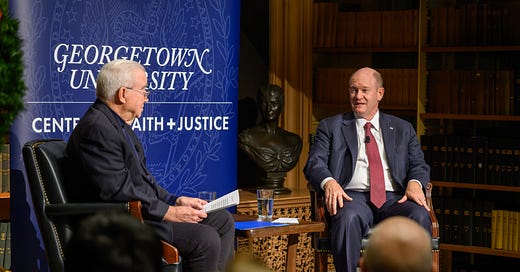A Senator reflects on the faith that inspires him
Chris Coons is one of the very few Washington political leaders who speaks personally, directly, honestly, and even confessionally about his Christian faith.
To ask political leaders to have a public conversation about how their faith, however they define it, shapes their personal lives and public service is what our Center on Faith and Justice is now regularly doing. We call the series “Higher Calling.” The first was with House Speaker Emeritus Nancy Pelosi in March.
We hosted the second Higher Calling conversation with Senator Chris Coons on November 28.
Chris Coons, who I regard as a friend, is one of the very few Washington political leaders who speaks personally, directly, honestly, and even confessionally about his Christian faith. So I wasn’t surprised, but was quite moved by the discussion we had about his own “higher calling.” A full room young people, including many Georgetown students, listened and asked deep questions about faith and public life.
I strongly recommend that you listen carefully to this conversation, a video recording of which is included below, as part of your own Advent reflections in this special season. I believe you will find it remarkable and even inspirational, as many told me it was for them.
Let me just share a couple of the things Senator Coons said in the festively decorated Riggs Library.
I asked him how he stays humble in a place like Washington, where humility is not a virtue. We engaged the text in Micah 6:8, which tells what God “requires” of us: “Do justice, love mercy and walk humbly with your God.”
Here is what he said:
“If you are a contributor, a chair of a committee or writing legislation, it is easy for you to think that you and you alone are the person who can solve problem x, y or z. Because I am chairman of the subcommittee that funds all foreign aid, many in my caucus look to me to deliver on the $9 billion humanitarian aid request that the President has sent up, and to be the one making the arguments. And thus the sense I occasionally have that if I fail, if this doesn’t happen, if literally millions of children starve as a result, it’s all my fault. So given how much I have tried to do and failed to do in the Senate, humility is easy. Forgiving, accepting that I am forgiven and feeling like it's OK to keep trying, that's the hard part, and there’s where faith comes in for me, personally.”
A student from the audience asked Senator Coons about faith and spiritual formation and how higher education relates to that. The Delaware student, part of the Senator’s constituency, said he had read Immanuel Kant’s essay “What is Enlightenment?” in which he argues that people should seek spiritual advice, not from spiritual advisors, but from themselves. Reflecting on his own Quaker education and relationship to God, the student then asked, “what role do you think educational institutions should play in the development of their student’s faith?”
To which his Senator replied:
“I think institutions that have a rich sense of a faith tradition and provide a wide range of opportunities for students to reflect on what they are called to be and who they are meant to be are more successful at education. I believe that we are created and I believe that we are created to have a relationship with our Creator. To go through higher education and not contemplate or wrestle with (these) questions: Are we created or not? Is this all accident or is it purposeful? Are we creatures or are we creations? And what does that mean for how we relate to each other? And what does that mean for me, about how I conduct myself and how I relate to the people I am blessed to work with and how I see the world? How can you be educated and not wrestle with (those) questions?
And so an institution of higher learning that doesn't wrestle with that question and does not support and facilitate wrestling with that question is a trade school. It is providing you with the mechanical skills to be successful in a career, and there is nothing wrong with that, but that’s not a university. That’s not preparing you for a rich and full and meaningful life.
I introduced Chris Coons that night by also saying that I often kid him about being the only theological Senator, because he went to Yale Law School and Yale Divinity School at the same time. And now he has been joined by the Reverend Senator Raphael Warnock, and they are the only two Senators with advanced degrees in religion.
Please, sit yourself down, and listen to the personal story of a senator who tries every day to root his personal life and public role as a political leader in his faith, theology, with spiritual disciplines and direction.






As of June 30, 2023, Yale University's endowment was $40.7 billion. This makes it the second-largest university endowment in the United States. Princeton Theological Seminary's endowment is $1.459 billion.
And now, the lost tradition of biblical debt cancellations https://michael-hudson.com/wp-content/uploads/2010/03/HudsonLostTradition.pdf